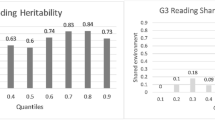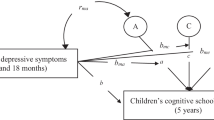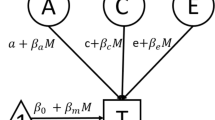Abstract
In previous work with a nationally representative sample of over 1,400 monozygotic and dizygotic twins born in the US, Tucker-Drob et al. (Psychological Science, 22, 125–133, 2011) uncovered a gene × environment interaction on scores on the Bayley Short Form test of mental ability (MA) at 2 years of age—higher socioeconomic status (SES) was associated not only with higher MA, but also with larger genetic contributions to individual differences in MA. The current study examined gene × SES interactions in mathematics skill and reading skill at 4 years of age (preschool age) in the same sample of twins, and further examined whether interactions detected at 4 years could be attributed to the persistence of the interaction previously observed at 2 years. For early mathematics skill but not early reading skill, genetic influences were more pronounced at higher levels of SES. This interaction was not accounted for by the interaction observed at 2 years. These findings indicate that SES moderates the etiological influences on certain cognitive functions at multiple stages of child development.



Similar content being viewed by others
Notes
Sample sizes are rounded to the nearest 50 in accordance with ECLS-B data security regulations.
\( heritability = \frac{{(a + a^{\prime} \cdot SES)^{2} }}{{(a + a^{\prime} \cdot SES)^{2} + (c + c^{\prime} \cdot SES)^{2} + (e + e^{\prime} \cdot SES)^{2}. }} \)
References
Alarcón M, Knopik VS, DeFries JC (2000) Covariation of mathematics achievement and general cognitive ability in twins. J Sch Psychol 38:63–77
Andreassen C, Fletcher P (2007) Early Childhood Longitudinal Study, Birth Cohort (ECLS-B) Psychometric Report for the 2-Year Data Collection (NCES 2007-084). U.S. Department of Education, Washington, DC
Bayley N (1993) Bayley scales of infant development, 2nd edn. The Psychological Corporation, San Antonio
Bouchard TJ, McGue M (1981) Familial studies of intelligence: a review. Science 212:1055–1059
Bradley RH, Corwyn RF (2002) Socioeconomic status and child development. Annu Rev Psychol 53:371–399
Bronfenbrenner U, Ceci SJ (1994) Nature-nurture reconceptualized in developmental perspective: a bioecological model. Psychol Rev 101:568–586
Byrne B, Delaland C, Fielding-Barnsley R, Quain P, Samuelsson S, Høien T, Olson RK (2002) Longitudinal twin study of early reading development in three countries: preliminary results. Ann Dyslexia 52:49–73
Cardon LR, DiLalla LF, Plomin R, DeFries JC, Fulker DW (1990) Genetic correlations between reading performance and IQ in the Colorado Adoption Project. Intelligence 14:245–257
Dickens WT (2007). What is g? Working paper. The brookings institution. http://www.brookings.edu/~/media/Files/rc/papers/2007/0503education_dickens/20070503.pdf. Accessed 12 Oct 2010
Docherty SJ, Kovas Y, Plomin R (2011) Gene-environment interaction in the etiology of mathematical ability using SNP sets. Behav Genet 41:141–154
Duncan GJ, Yeung WJ, Brooks-Gunn J, Smith JR (1998) How much does poverty affect the life chances of children? Am Sociol Rev 63:406–423
Duncan GJ, Dowsett CJ, Claessens A, Magnuson K, Huston AC, Klebanov P, Japel C (2007) School readiness and later achievement. Dev Psychol 43:1428–1446
Feinstein L (2003) Inequality in the early cognitive development of British children in the 1970 cohort. Economica 70:73–98
Forget-Dubios N, Pérusse D, Turecki G, Girard A, Billette J, Rouleau G, Tremblay R (2003) Diagnosing zygosity in infant twins: physical similarity, genotyping, and chorionicity. Twin Res Hum Genet 6:479–485
Friend A, DeFries JC, Olson RK (2008) Parental education moderates genetic influences on reading disability. Psychol Sci 19:1124–1130
Friend A, DeFries JC, Olson RK, Pennington B, Harlaar N, Byrne B, Keenan JM (2009) Heritability of high reading ability and its interaction with parental education. Behav Genet 39:427–436
Goldsmith HH (1991) A zygosity questionnaire for young twins: a research note. Behav Genet 21:257–269
Harden KP, Turkheimer E, Loehlin JC (2007) Genotype by environment interaction in adolescents’ cognitive aptitude. Behav Genet 37:273–283
Harlaar N, Hayiou-Thomas ME, Plomin R (2005) Reading and general cognitive ability: a multivariate analysis of 7-year-old twins. Sci Stud Read 9:197–218
Hart SA, Petrill SA, Thompson LA, Plomin R (2009) The ABCs of math: a genetic analysis of mathematics and its links with reading ability and general cognitive ability. J Educ Psychol 101:388–402
Haworth CMA, Wright MJ, Luciano M, Martin NG, de Geus EJC, van Beijsterveldt CEM, Plomin R (2010) The heritability of general cognitive ability increases linearly from childhood to young adulthood. Mol Psychiatry 15:1112–1120
Kovas Y, Harlaar N, Petrill SA, Plomin R (2005) ‘Generalist genes’ and mathematics in 7-year-old twins. Intelligence 33:473–489
La Paro KM, Pianta RC (2000) Predicting children’s competence in the early school years: a meta-analytic review. Rev Educ Res 70:443–484
Leseman PPM, de Jong PF (1998) Home literacy: opportunity, instruction, cooperation and social-emotional quality predicting early reading achievement. Read Res Q 33:294–318
Light JG, DeFries JC, Olson RK (1998) Multivariate behavioral genetic analysis of achievement and cognitive measures in reading-disabled and control twin pairs. Hum Biol 70:215–237
Loehlin JC, Nichols RC (1976) Heredity, environment, and personality: a study of 850 sets of twins. University of Texas Press, Austin
McGue M (1997) The democracy of the genes. Nature 388:417–418
Muthén O, Muthén L (1998–2010). MPlus user’s guide, Sixth Edition. Los Angeles, CA: Muthén and Muthén
Najarian M, Snow K, Lennon J, Kinsey S (2010) Early Childhood Longitudinal Study, Birth Cohort (ECLS-B), Preschool–Kindergarten 2007 Psychometric Report (NCES 2010-009). U.S. Department of Education, Washington, DC
Phillips M, Crouse J, Ralph J (1998) Does the Black–White test score gap widen after children enter school? In: Jencks C, Phillips M (eds) The Black–White test score gap. Brookings Institution Press, Washington, DC, pp 229–272
Purcell S (2002) Variance components models for gene-environment interaction in twin analysis. Twin Res 5:554–571
Rowe DC, Jacobson KC, Van den Oord EJCG (1999) Genetic and environmental influences on vocabulary IQ: parental education level as moderator. Child Dev 70:1151–1162
Taylor J, Schatschneider C (2010) Genetic influence on literacy constructs in kindergarten and first grade: evidence from a diverse twin sample. Behav Genet 40:591–602
Taylor J, Roehrig AD, Hensler BS, Connor CM, Schatschneider C (2010) Teacher quality moderates the genetic effects on early reading. Science 328:512–514
Tucker-Drob EM, Rhemtulla M, Harden KP, Turkheimer E, Fask D (2011) Emergence of a gene-by-socioeconomic status interaction in infant mental ability from 10 months to 2 years. Psychol Sci 22:125–133
Turkheimer E, Gottesman II (1991) Individual differences and the canalization of human behavior. Dev Psychol 27:18–22
Turkheimer E, Haley A, Waldron M, D’Onofrio B, Gottesman I (2003) Socioeconomic status modifies heritability of IQ in young children. Psychol Sci 14:623–628
Wainwright M, Wright MJ, Geffen GM, Geffen LB, Luciano M, Martin NG (2004) Genetic and environmental sources of covariance between reading tests used in neuropsychological assessment and IQ subtests. Behav Genet 34:365–376
Acknowledgments
Preparation of this article was supported by National Institutes of Health grant R21 HD069772 to E. M. Tucker-Drob and a Banting Postdoctoral Fellowship to M. Rhemtulla. EMTD is a faculty research associate at the Population Research Center at the University of Texas at Austin, which is supported by National Institutes of Health center grant R24 HD042849. The analyses presented here use data from the ECLS-B data file, which was provided by the US Department of Education National Center for Education Statistics.
Author information
Authors and Affiliations
Corresponding author
Additional information
Edited by Danielle Dick.
Rights and permissions
About this article
Cite this article
Rhemtulla, M., Tucker-Drob, E.M. Gene-by-Socioeconomic Status Interaction on School Readiness. Behav Genet 42, 549–558 (2012). https://doi.org/10.1007/s10519-012-9527-0
Received:
Accepted:
Published:
Issue Date:
DOI: https://doi.org/10.1007/s10519-012-9527-0




